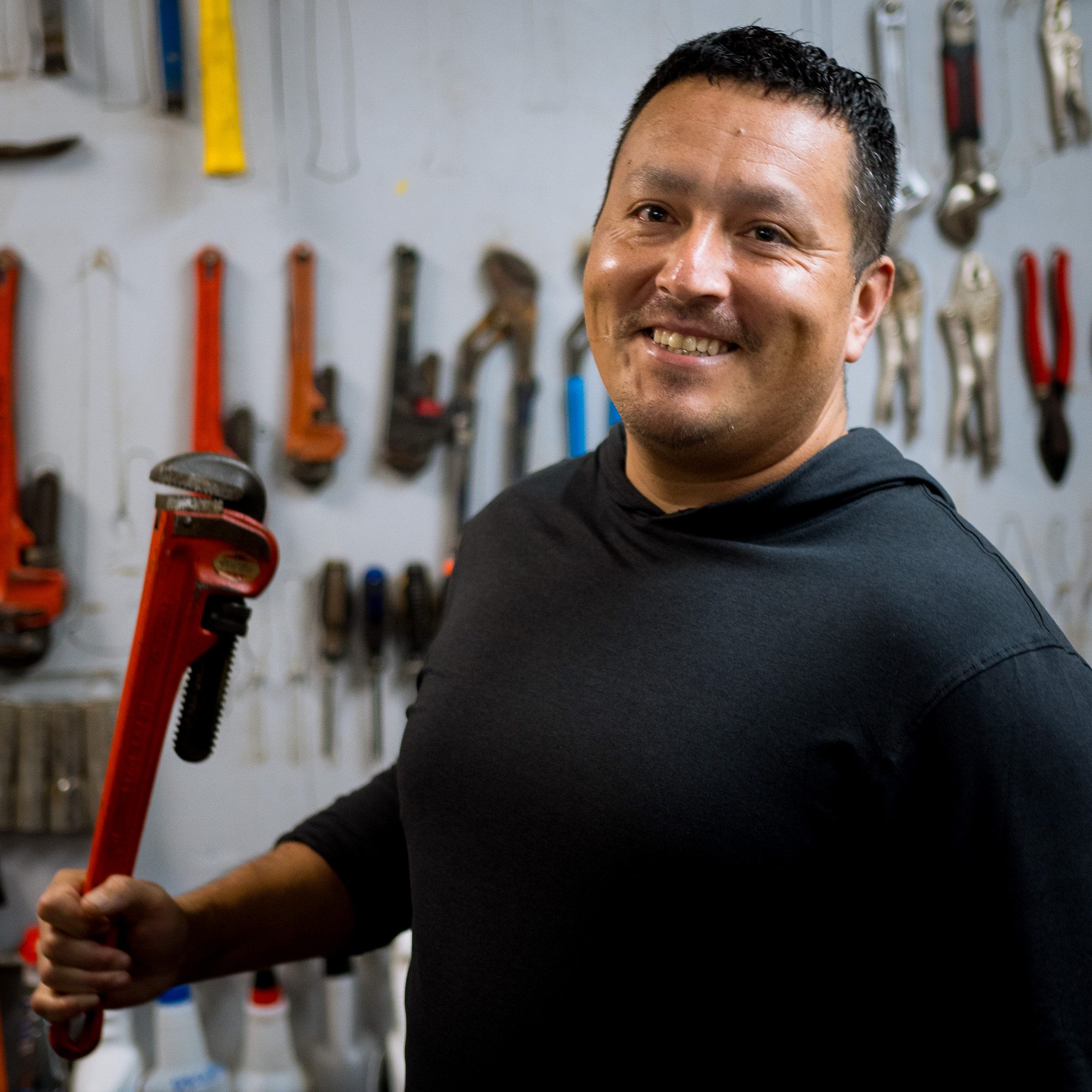Tony is a quiet strength and a warm presence. You may not know him, but if you do, it’s likely he has made an impact on you. He is one of those people who has a reserved discipline to him, but an incredibly inspiring kindness. When I first met Tony, something struck me about him. I couldn’t put my finger on exactly what it was, but what I could tell was that this was a courageous individual. I was always curious about who he was and what exactly I couldn’t put my finger on—it’s now evident why he struck me in such a profound way upon our first interaction. Tony has had an exceptionally unique life experience that has molded him into the person he is today, and why he carries himself with such bold strength. Tony has seen it all. From firefighter to strip club bouncer to private security and, finally, to grateful member of the Beit T’Shuvah community.
Tony was born in Los Angeles but, at the age of five, moved to Montana to live with his grandparents. After leaving his mother, two years later, his father moved the two of them to 60 acres of land in Montana in the middle of the woods. They lived in a trailer while his dad built the home they would eventually live in together. Tony’s father was a successful engineer turned logger, a domineering man with a volatile temper, “That’s probably where the trauma in my life began,” Tony recalls. From the age of seven, he was subjected to physical abuse—beaten with fists and 2×4s—while simultaneously being raised under the shadow of militant religious extremism and paranoia. He learned to log forests, shoot automatic weapons, fire diesel trucks, cook, and serve a father who measured love in obedience and punishment.
Even as the abuse unfolded, Tony absorbed the complexities of faith and morality. He remembers sitting for the rosary, attending Mass, serving as an altar boy, and being surrounded by the towering presence of his father’s library. “I always thought I was going to hell for my mistakes. But eventually, I kept what was good and discarded what was bad. God is real, but the Catholic Church isn’t for me.” From this crucible, a moral compass emerged—one guided not by fear or authority, but by principle.
The first true break from that suffocating world came when Tony called his grandmother in desperation after one particularly brutal beating. His grandfather arrived immediately, shotgun in the passenger seat, and whisked Tony to the safety of his grandparents’ home. “From then on, my life changed. I went from a strict Catholic, anti-government, end-times extremist upbringing to what felt like a new world.” Here, Tony found safety, love, and freedom from fear. He had a room of his own, was encouraged to learn at his own pace, and began to experience life outside a lens of constant threat. He could watch TV, read non-religious fiction, and eat snacks without fear of being beaten.
High school brought both challenges and growth. Shelter had made him socially awkward, unfamiliar with popular culture, and often the target of bullies. But his love of knowledge endured, and by senior year, he had begun to find confidence. It was also around this time that he discovered alcohol—his first drink offered him acceptance amongst peers, “For me, drinking was about being accepted and fitting in,” he says. He didn’t like the taste of beer, or how it made him feel, but in small-town Montana, beer was a passport into belonging, a rare chance to feel noticed and appreciated.
That burgeoning self-confidence reached a turning point when he stood up to his father, a state champion wrestler. After an altercation on his family property, Tony beat his father so severely that he was hospitalized. “I spent all my life thinking that I wasn’t strong…but I didn’t know that. I snapped, and I beat him into the hospital.” Within that moment of bloodied violence, Tony discovered a well of inner strength, a realization that he could face adversity and emerge unbroken. As a result, he was looking at attempted murder. Thankfully, his father chose not to press charges.
With newfound self-assurance, built from the darkest of places, Tony pursued life on his own terms. He attended college for sports medicine, became a wildland firefighter, and cultivated the physical prowess that would both define and sustain him through bodybuilding. Women wanted him. Men wanted to be him. Tony experienced his first deep, five-year relationship—an introduction to love and intimacy that was as transformative as it was grounding.
But life’s challenges continued. Alcohol, initially a social lubricant, grew into a relentless companion. By his thirties, Tony was consuming up to half a gallon of vodka a day, all while maintaining the responsibilities of a full-time manager. At times, he would mask his alcoholic breath by drinking soapy water—burping a fresh scent with every word.
He describes it matter-of-factly: “It was just me and God. I didn’t think I needed any counseling for a lifetime’s worth of messed-up experiences.” Alcohol masked pain, provided fleeting acceptance, and fed the isolation that had accompanied him from childhood.
Tony’s pursuit of adventure and change led him to Los Angeles, where the nightlife introduced him to strip clubs and bouncer work. The strip club management liked him. He was level-headed, firm when he needed to be, but low-key. He drank whiskey when he worked to give him that extra edge—just in case he had to lay down the law. Tony immersed himself in the world of private security, dating a stripper for five years, navigating moral ambiguity and the shadows of his own choices. Yet even amid that chaos, a quiet awareness persisted: something had to change.
A move to the San Juan Islands in Washington marked a turning point for his sobriety. “I quit drinking for a year. That’s when I first decided to make an entire lifestyle change. I quit dating. I quit masturbating. I quit cursing. I started reading the Bible. I spent hours a day walking on the island and praying. There was a monastery there, our Sisters of the Lady of the Rock, and I was the groundskeeper for a church there. I started going to a little church on Shaw Island, with a population of 90 people. I disconnected myself from the grid from the mainland.” Tony found a new way to connect to his Christianity—redefining his traumatic religous roots into a beautiful connection with God.
Trials soon followed and years of self-reliance proved insufficient against the weight of accumulated trauma. A year down the line, he relapsed on what was supposed to be a couple of days off and then back to work.
Next came stints at various rehabs, but nothing stuck. Tony never stayed more than four days, and began to lose hope in the rehabilitation system. He soon became suicidal, and it was at this nadir that Tony found Beit T’Shuvah. He reached out, hoping this Jewish rehab would admit him despite his Christian faith. We did. And eventually this little Jewish rehab redefined his understanding of recovery, community, and trust. “Life can be done with others. You don’t have to do it all alone. I’ve learned that here.” Through patience, guidance, and compassion, he has rebuilt not just his sobriety but faith in humanity and in himself.
Tony often reflects on the words of St. Francis of Assisi: “Go preach the gospel; if necessary, use words.” It is a guiding philosophy—to live faith authentically rather than impose it on others. As he navigated recovery, Tony also embraced resilience through self-reflection: “It’s not about how hard you can hit; it’s about how much you can get hit and keep moving forward.”
He discovered that the measure of strength was not the absence of struggle, but the ability to endure and rise. “I could face adversity and emerge unbroken,” he says. Through Beit T’Shuvah, he has realized that personal redemption is inseparable from connection with others. Tony has a work therapy internship for the maintenance department. He wakes with the roosters crow, clocks in at crack of dawn, and still makes free time to study himself, learn, and grow—and you can tell.
Today, Tony’s life stands as a testament to resilience, moral integrity, and quiet courage. He carries his past without letting it define him, lives his faith authentically, and embraces the lessons learned from suffering and redemption. Through his time here at BTS, Tony has learned not to let the little things derail him. Life flows through and around him smoothly, he holds still and at peace, staying focused and productive. Tony remains, as ever, a quiet strength and warm presence—a man who has endured the unimaginable, yet chosen love, purpose, and community through it all.

